How We Test And Review Products
At The Skillful Cook, we review pots, pans, and other products so you can find the ones that work best in YOUR kitchen.
We know every home cook has different priorities and goals. (Do you want to level up your French omelet skills or just find affordable cookware that’s actually non-toxic?)
We know every manufacturer tells you their stuff is better than the rest – and might bury product details that don’t serve their story.
And we know how hard it is to trust what you read on the internet.
That’s why we take our roles as product reviewers seriously.
We dig into research, test products with our own hands, and cut through marketing jargon to create our reviews. We hold ourselves to high standards and don’t recommend products unless we really believe they will serve our consumers well.
We’re here to help you understand WHY some products work better than others and to use that knowledge as power in your own cooking. — And we find THAT just about as satisfying as whipping up a perfect Tiramisu.
On this page, we explain how we approach our review process and how we decide which products receive our mark of approval.
Who We Are
Our team at The Skillful Cook consists of home cooks, professional chefs, recipe developers, and qualified medical professionals. Learn more about us.
How We Make Money
We are transparent about the fact that we rely on affiliate programs to support our operational expenses. Some of our articles contain affiliate links. If you buy products through our links, we may receive compensation.
We receive compensation at no extra cost to you.
That said, our product scores are based on in-depth research and testing. Affiliate programs do not affect our product scores and recommendations.
Our Review Process
These are the steps we take when we review products.
1. We conduct extensive research on the product category.
Before reviewing a product, we investigate the entire product category to determine which factors differentiate one product from another or make it worth buying.
Our research goes beyond the claims made on sales pages. We draw from our experience cooking in home and professional settings to evaluate whether those claims make sense in real-life use cases. We comb through data sources such as product manuals, instructional videos, and patent records to make sure we understand the product’s function.
We sift through online discussions and forums to understand user experiences and concerns. With this research, we compile a list of criteria to use as a basis for product review and testing.
2. We select products for review.
Once we have established the rating criteria, we select the products for review. We also consider these factors when choosing products:
We are committed to bringing you the facts and have qualified medical professionals fact-checking all health-related claims in our articles.
3. We get the product and test it.
Once we have a list of products worth testing, we either order the product or search for other ways to get it.
Sometimes, we borrow the product from people who own it and interview them about their experience using it. Testing a used product allows us to see how the product holds up long-term and gives us unique perspectives from home cooks who use it every day..
If we order a product, we go through the same process that you would. We place our order online, pay for it, wait for the delivery, unpack, take photos and measurements, and then get cooking!
What We Look For When Testing
When we test a product, we’ll first measure it with tools that help us understand the quality of its construction. We look for things that make one product stand out above others in its class and notice details that other reviewers might miss.

For example, when we tested 12” stainless steel skillets, we discovered that the All Clad pan was thicker than the Calphalon Premier pan – but that the Calphalon was significantly heavier! That’s because the Calphalon pan had thicker stainless steel layers and a thinner aluminum core than All Clad. This means that the Calphalon pan would be more resistant to denting – but that the All Clad would be more responsive to temperature changes.
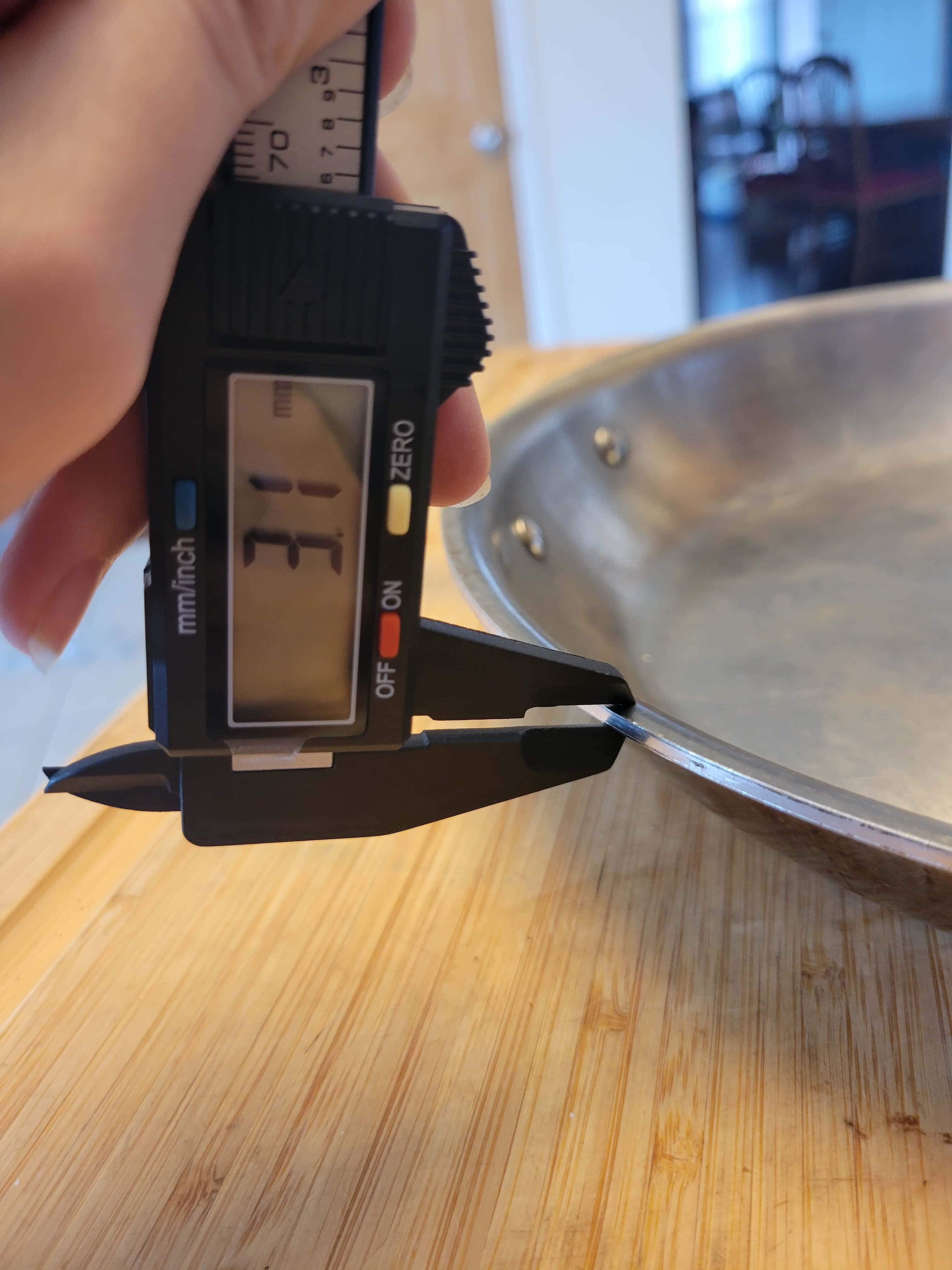
Cooking Tests: To determine how well the stainless steel pans handled eggs, we timed how long it took to heat the pans to a point where water droplets started to form a “mercury ball,” meaning that the pan had reached the perfect temperature for cooking.
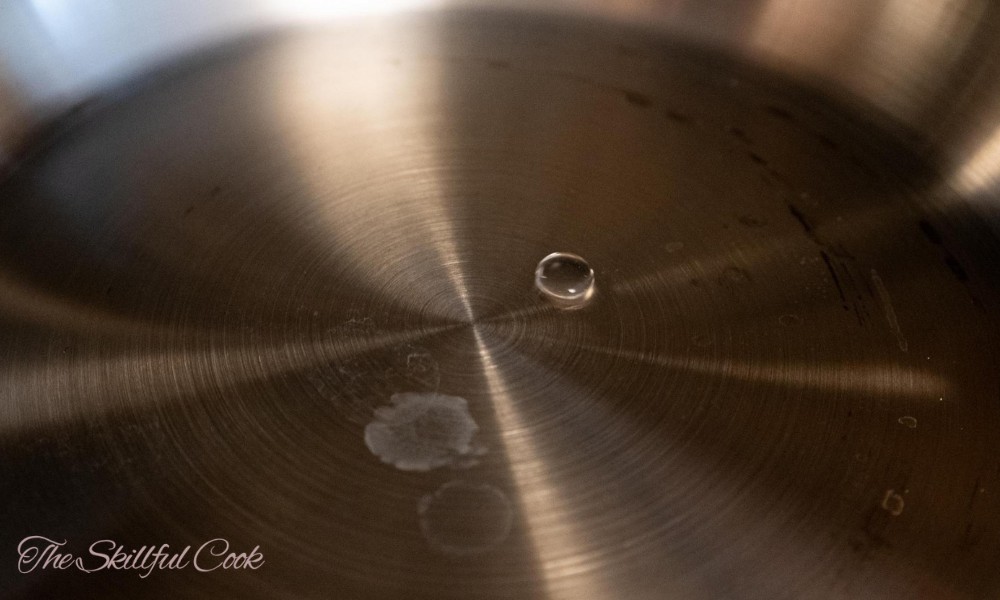
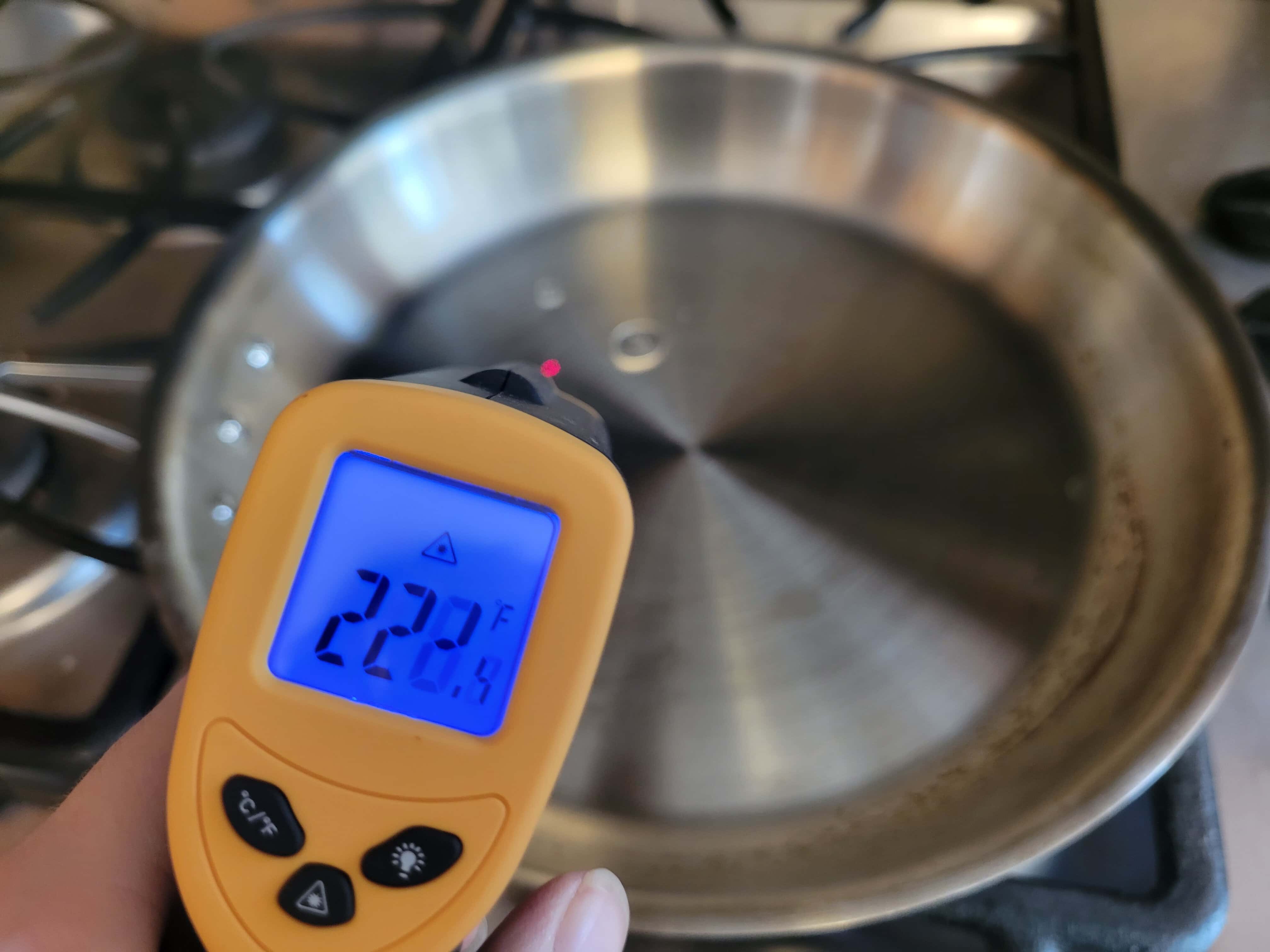
Then, we added a bit of oil and cooked the eggs. With this experiment, we tested whether the pan would overheat the eggs and make the delicate egg protein stick.
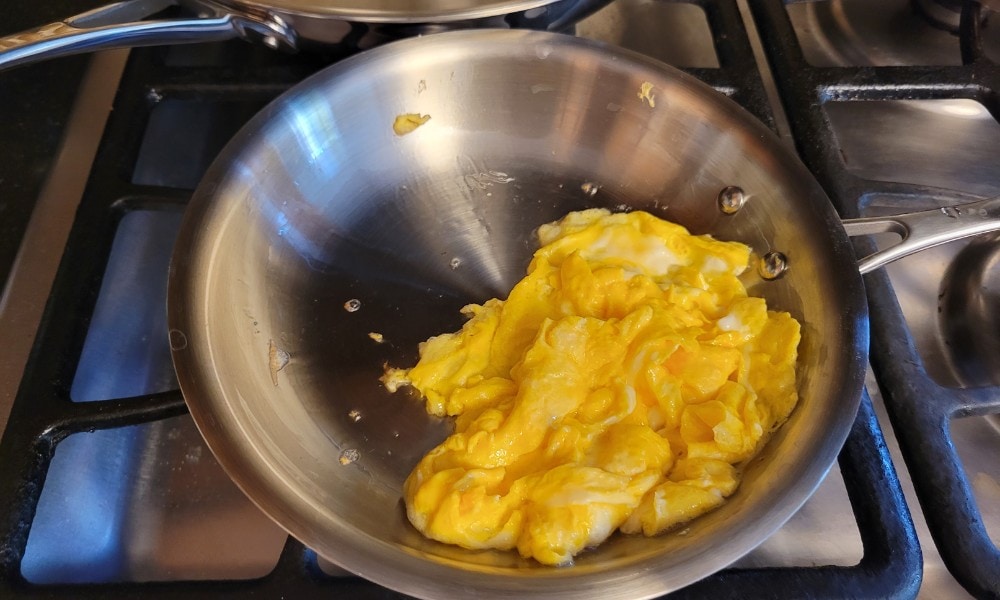
Next up, we conducted the water boiling test. We filled the skillet with one cup of room-temperature water and turned the heat to medium-high. The goal was to test how fast the water would come to a boil and whether the heat would get transferred evenly across the entire pan.
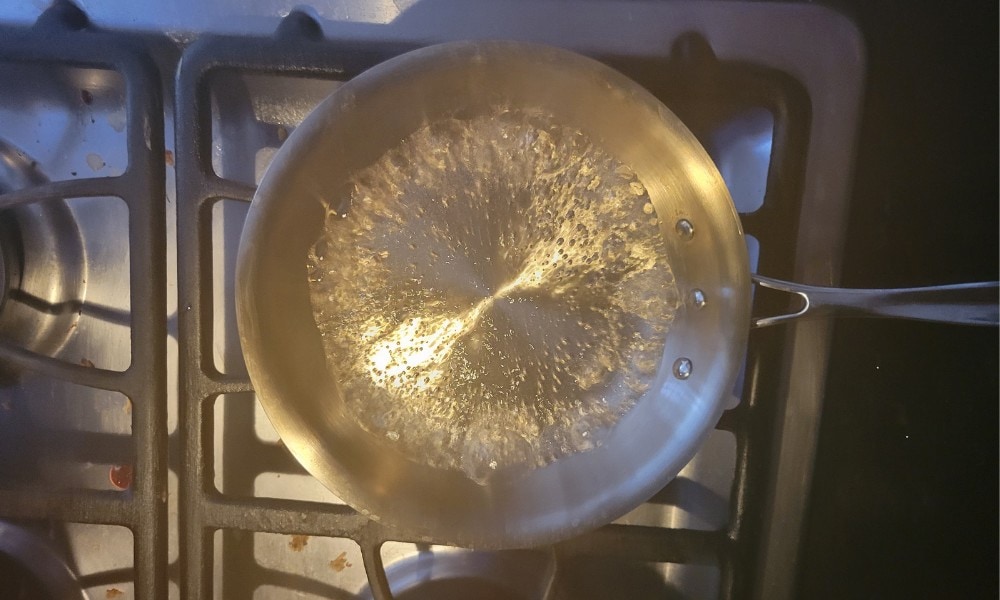
4. We scour through countless buyer reviews.
While we learn a lot by testing products in our kitchens, we don’t want to rely on one single experience.
For this reason, we turn to “the wisdom of the people” to get an accurate picture of a product’s quality and how it compares with the brand’s marketing claims.
We scour through verified buyers’ positive and negative reviews to understand their experiences and bring you a well-rounded picture of the product’s performance.
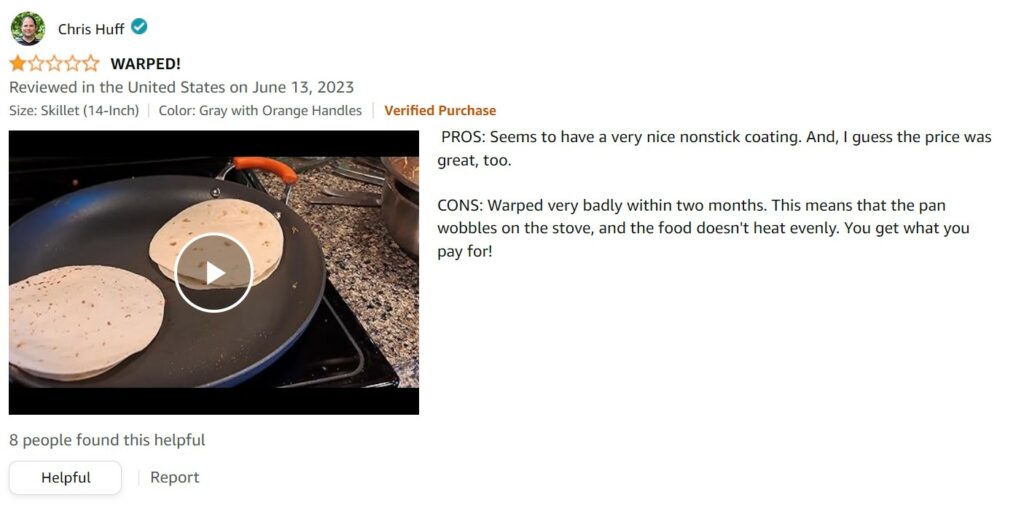
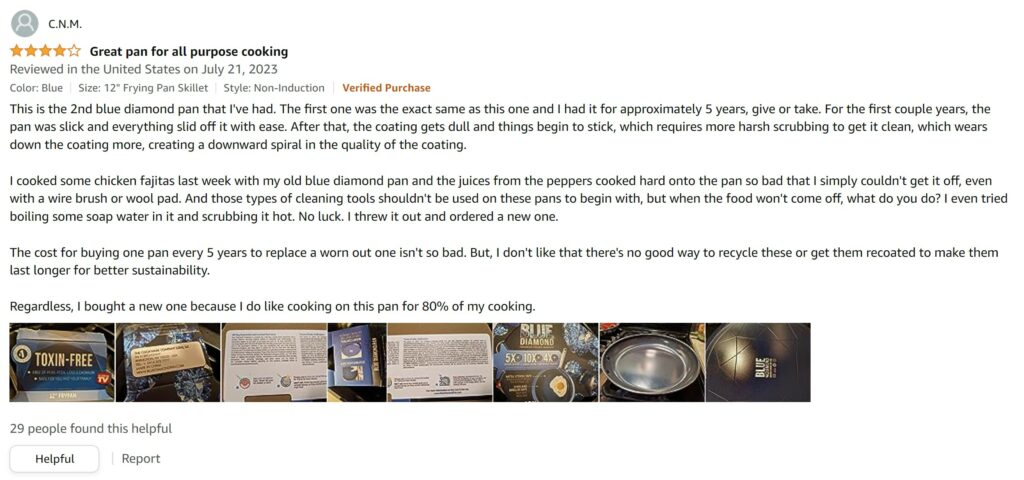
5. We consider the brand’s history and reputation.
When reviewing a product, we research its history and reputation to assess if there are any risks for you, the consumer.
We are on the lookout for these things precisely:
6. We consider product safety
There is a lot of debate surrounding the safety of different cookware materials. When selecting products, we assess the scientifically known or suspected risks of the material it’s made from and do our best to recommend products likely to be safe to use.
We base our assessment on peer-reviewed studies, research from medical associations, academic research institutions, and statements from public health agencies, such as:
We are committed to bringing you all sides of controversial issues so you can make informed decisions about products for yourself or your loved ones. We have qualified medical professionals fact-checking all health-related claims in our articles.
7. We scrutinize the marketing claims
In a market flooded with enticing brand promises and clever marketing language, it can be challenging to distinguish fact from exaggeration. Labels toss terms around like “Healthy Cookware,” “Non-toxic,” “Nonstick Diamond Ceramic,” “PFAS-free,” and so on often create more confusion than clarity.
We don’t take these claims at face value at The Skillful Cook.
We read third-party test results and fine print on manufacturer’s websites to reveal the truth about kitchen products. We use our knowledge of industry practices demystify jargon and help you learn to read labels confidently.
8. We consider the product’s pricing and value for money
We evaluate how the product’s quality, performance, design, and usability stack up to its price. In short, is it worth the money?
For our reviews, we select good products with different price points so that you can find the ideal product for your needs, regardless of your budget.
Regarding Round-up Reviews
A “round-up review” is a style of article that helps you buyers find the best options for a type of product you intend to purchase. To be most helpful in such cases, suggest a wide selection of products so you can understand all the options out there and the differences between them. In these cases, and in casual references to products in other articles, we may not handle every one of the products we recommend. However, our recommendations are always based on extensive knowledge of the product category, thorough research, and the experience of users who actually bought and used the product.
What we DON’T do
We won’t publish anything without thorough research
We understand the huge responsibility of giving product recommendations, especially if the products have contact with food.
You can be sure that anything we recommend on our website is something we’d be comfortable using for our own families. If a product has pros and cons, we try to make both sides clear.
We don’t accept sponsorship fees
Some brands will pay good money to have independent publishers write favorable reviews about their products. We categorically reject such offers. We would never risk our reputation for short-term gain.
Regarding Round-up Reviews
A “round-up review” is a style of article that helps you find the best options for a type of product you want to purchase. To be most helpful in such cases, we suggest a wide selection of products so you can understand all the options out there and the differences between them. In these cases, and in casual references to products in other articles, we may not handle every one of the products we recommend. However, our recommendations are always based on extensive knowledge of the product category, thorough research, and experience of users who actually bought and used the product.
If you have any questions about our process of product reviewing and testing, feel free to contact us.
To learn more about our team and our mission, visit our about page.